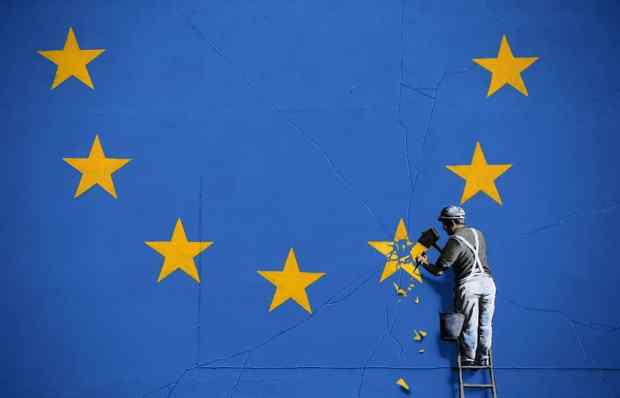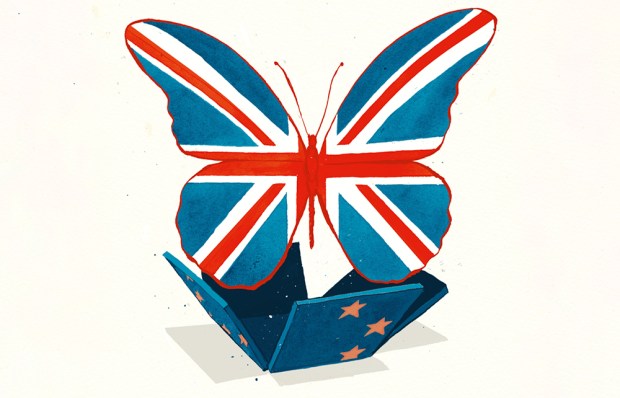For many people, next Friday was supposed to be a celebration. Boris Johnson spoke about an ‘independence day’ marking the beginning of a new era of national self-confidence. But as we approach 29 March, not even ardent Brexiteers can claim that there is anything to celebrate. Theresa May has been reduced to asking, or rather begging, the EU for an extension to Article 50 — something that the EU has said it will grant only if Britain can provide a good reason for needing the extra time. So far, the Prime Minister has not provided one, apart from the prolonging of every-one’s agony.
When parliament voted to enact Article 50 two years ago, the challenge seemed daunting but perfectly possible. The government had a clear strategy: to negotiate a free trade deal with the EU while leaving the single market and customs union. If it wasn’t possible to agree a good deal with the EU, we would leave without one, but well prepared for what followed.
Instead, with only a week to go until the date on which we were supposed to leave, no one is any the wiser as to how events will play out. After a reckless gamble on an early election, May lost her majority, then lost her nerve. Calamitously, she agreed to the EU’s sequencing of talks: that we would discuss a trade deal only after we’d agreed how much money we would hand over and what we would do about the Irish border. Then she lost control over her government, allowing those opposed to Brexit to make sure there was no proper no-deal plan. This all led to the shameful mess before us now.
What has gone wrong will be studied by politicians for years, and will keep historians occupied for much longer. Lord North is one of the few beneficiaries of the May premiership: he is now no longer the worst prime minister in our history.
Few come out well from the fiasco. May has exposed her character faults for all to see. Her lack of imagination, inability to lead a team or solve complex problems led to her calling an early election. She hoped for a large majority, after which she intended to rule by a form of personal diktat. This, combined with an organisational incompetence exposed during the election campaign, would have been a disaster.
The country deserved a better leader than her, but the Conservatives have been unable to provide one. It will be some time before voters forget or forgive the party for all that has stemmed from what is, essentially, a failure of leadership.
While one might admire Michel Barnier and his team for exhibiting better leadership, his tactics have reminded the world of what is wrong with the EU. It has demonstrated its protectionist instincts towards those outside its club, and acted as if its chief objective was to punish Britain for daring to leave, rather than trying to set up a constructive relationship with an ex-member. We have seen why the EU has, through its intransigence, become a source of instability in Europe.
The Brexit process has exposed faults, too, in our own civil service. As one civil servant wrote anonymously in the Daily Telegraph this week, of the thousands of colleagues he has worked with over the past three years he can remember a mere five who approved of Brexit — this in a country that voted 52 per cent in favour of leaving the EU. The civil service is rightfully keen on ensuring a diversity of its workplace, but risks recruiting from a pool of graduates who all think alike on many issues. That matters, because while civil servants might try their hardest to suppress their own political views when working in the service of the elected government, it is hard for them to do so when they are in an environment where all conversation confirms their prejudices.
Brexit is only ever going to be worthwhile if Britain can take full advantage of the freedoms which would come with leaving the EU. We would be able to become a more open economy with lighter-touch regulation. The biggest fear in the EU hierarchy has always been that Britain would do just this, and attract investment away from mainland Europe — hence the clever tactic of using the Irish border as a device to trap Britain in the customs union where we would be unable to make our own trade deals.
If the government is to have extra time to negotiate a deal, or to prepare for a no-deal exit, it is imperative that it starts with an idea of what it wants to achieve by leaving the EU. What kind of economy does it see emerging in a newly independent Britain? How does it want the country to diverge from the EU? Almost three years after the vote, the Tories have no coherent answers to these questions.
While a great many people had a hand in the Brexit mess, the principal blame lies with the Tories. They cannot, now, fix the Brexit mess but the question is whether the Conservative party can fix itself. If it has any instinct for survival, then it should not wait for too much longer to provide an answer.
Got something to add? Join the discussion and comment below.
Get 10 issues for just $10
Subscribe to The Spectator Australia today for the next 10 magazine issues, plus full online access, for just $10.
You might disagree with half of it, but you’ll enjoy reading all of it. Try your first month for free, then just $2 a week for the remainder of your first year.














Comments
Don't miss out
Join the conversation with other Spectator Australia readers. Subscribe to leave a comment.
SUBSCRIBEAlready a subscriber? Log in